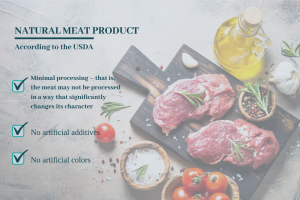Meat production in harmony with nature in the European Union
Consumers are increasingly conscious in their choices and demand a return to more natural products. It’s especially noticeable in the EU and in North America.
WARSAW, POLAND, April 17, 2020 /EINPresswire.com/ -- Consumers are increasingly conscious in their choices and demand a return to more natural products. This is a global trend and it’s closely connected to rising levels of education and standards of living. It’s especially noticeable in European Union and in North America, where the majority of consumers are now paying close attention to the list of ingredients on the products they buy.
According to the USDA (United States Department of Agriculture), for a meat product to be called natural, it must meet the following criteria:
• No artificial additives
• No artificial colors
• Minimal processing – that is, the meat may not be processed in a way that significantly changes its character
And there’s more – the label must include an explanation of what this term means, for instance in the case a bacon labelled as natural there must be an information explaining that it does not contain artificial ingredients and is minimally processed.
Along with the idea of “naturalness”, we often find terms such as “no hormones” or “no antibiotics”. The phrase “no hormones” can have a different meaning depending on the type of meat it refers to. In the case of pork, since the use of growth hormones in swine production is banned in the US, and the phrase “without added hormones” can only be used on labels together with the information that federal regulations prohibit the use of hormones in pork production. In the case of beef production, the situation is different ; the phrase “no hormones administered” is only allowed when the producer has submitted documents to the FSIS (Food Safety and Inspection Service) which confirm that no growth hormones were used in raising the animals.
The phrase “no antibiotics” may only be used when the producer has submitted documentation confirming that the animals were reared without the use of antibiotics.
Consumers associate naturalness with the absence of antibiotics, hormones, artificial colors or other additives. For a product to be recognized as natural, it must satisfy a whole series of requirements at every stage of its production. It just so happens that these requirements are a core part of European standards.
First of all, it’s worth pointing out that any meat from the European Union is by default produced without the use of growth hormones. This ban was introduced as early as 1981 to protect the health of European consumers. As a result of regulations like this one, also the natural environment is protected, where these hormones can accumulate after being added to the feed and excreted from the animals’ bodies. The situation is similar with antibiotics – the use of antibiotics in feed as a growth stimulators has been banned in the EU since 2006. This ban on the use of antibiotics has a secondary positive effect in that it limits opportunities for bacteria to develop resistance to substances which are widely used to combat them. The absence of such regulation in the USA has caused that a much larger number of drug-resistant bacteria can find their way into the natural environment, where they can have a disruptive effect on ecosystems. As a result of this restrictive approach, for years the European Union has been the global leader in reducing the use of antibiotics in spite of a generally increasing volume of livestock farming.
In the same way, the European Union takes a restrictive approach to meat processing. One good example are the regulations concerning the maximum amounts of sodium nitrite added to food products. In the EU, this maximum is 100 mg per 1 kilogram of product , while in the United States and Canada this limit is two times higher, amounting to 200 mg per 1 kg of product. These limits reflect consumer preferences; in the EU, as many as 78% of those surveyed say that
“clean ingredients list” in meat and meat products is a very important aspect of their consumer choices.
European meat products, in particular unprocessed products, have a natural character because of, among other things, the restrictive requirements and limitations on the use of additives which consumers don’t want. It’s worth remembering that natural products are enjoying steadily increasing popularity in America – “clean ingredients list” is important for 44% of American consumers, while 76% believe that these types of products are much healthier.
All information on the campaign and current activities carried out within its framework are available on the website and on the Youtube channel.
Discover with us the advantages of European red meat and its products!
ABOUT UPEMI:
The Union of Producers and Employers of Meat Industry (UPEMI) is a dynamic and modern organization integrating the environment of pork and beef producers in Europe. Our mission is to provide reliable and comprehensive information on high-quality meat products and the promotion of European meat on foreign markets. Our members are companies that share the values of honest animal husbandry and the production of quality pork and beef.
Meat with European quality campaign
Union of Producers and Employers of Meat industry
8587458
email us here
Legal Disclaimer:
EIN Presswire provides this news content "as is" without warranty of any kind. We do not accept any responsibility or liability for the accuracy, content, images, videos, licenses, completeness, legality, or reliability of the information contained in this article. If you have any complaints or copyright issues related to this article, kindly contact the author above.

